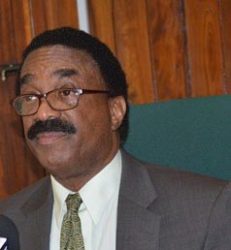The High Court has ordered Attorney General (AG) Basil Williams SC to appoint the Governing Board of the Deeds and Commercial Registries Authority.
Justice Nareshwar Harnanan on Wednesday made absolute the order nisi of mandamus which attorney and former AG Anil Nandlall had applied for to compel Williams to appoint the board.
By extension, the ruling caters for the Authority to discharge its functions in accordance with the Deeds and Commercial Registries Authority Act, which also provides for the board to hold regular meetings.
In addition to the order being made absolute, Justice Harnanan ordered the AG to pay Nandlall $100,000 dollars as costs.


Nandlall had previously noted that government had tabled a bill to amend the Act to empower the AG to act in place of the Governing Board when none is appointed. He advanced that because of this, Williams was refusing to appoint a board and resultantly wanted “to change the law to say that when there is no Board he is to act as, and in place of, the Board.” That bill, he noted, is still pending.
In his application to the court, Nandlall noted that the Act establishes the entity as a corporate body to establish and promote the efficient and orderly operation of the Authority, to establish the conditions governing the employment of officers and employees of the Authority, to provide for funding of the operations of the Authority, and for connected matters.
Nandlall further pointed out that Section 5(1) of the Act establishes a Governing Board of the Authority to ensure its proper and efficient performance. The Act provides that the Governing Board shall consist of a Chairman appointed by the Minister of Legal Affairs, the Registrar of Deeds, the Registrar of the Commercial Registry, a nominee of the Ministry of Finance, a nominee of the Ministry of Housing and Water, a nominee of the Guyana Bar Association, a nominee of the Guyana Association of Legal Professionals and a nominee of the Private Sector.
Nandlall said that apart from the ex-officio members, the tenure of the members of the Board, who were last appointed on or about June, 2013, expired on or about June 2016, and they were never re-appointed by the minister in accordance with the Act.
Nandlall said that this and all omissions to perform duties imposed by the Act constitutes multiple breaches, misfeasance in public office and abuse of power and conflict with the policy of the Act. He added that the board was non-functional, not properly constituted and had not held a meeting for over a year.
As a consequence, he said there was inefficiency in the services rendered at the registries, which had an adverse impact on his practice and his ability to competently and diligently discharge his duties to clients.
In his affidavit, dated March 6, 2017, Nandlall said the breaches constitute infractions of the law and amount to unlawful conduct by public officers for which, as an attorney, he feels compelled to seek rectification in the courts.
According to Nandlall, he had written to Williams, calling upon him to discharge his obligations under the Act and to appoint members to the board but never received a response.
In a letter, which was seen by Stabroek News and dated January 27, 2017, Nandlall referred to what he termed “innumerable administrative problems,” which he said are being encountered on a daily basis by the Authority and affecting its ability to discharge daily functions.
According to Nandlall, one of the main reasons for creating the Authority was to remove the registries from Central Government and, more particularly, from ministerial influence and to make them autonomous corporate agencies that can hire their own staff on terms and conditions determined by the Authority. The ultimate objective, he said, was to increase the efficiency and speed with which they function.





